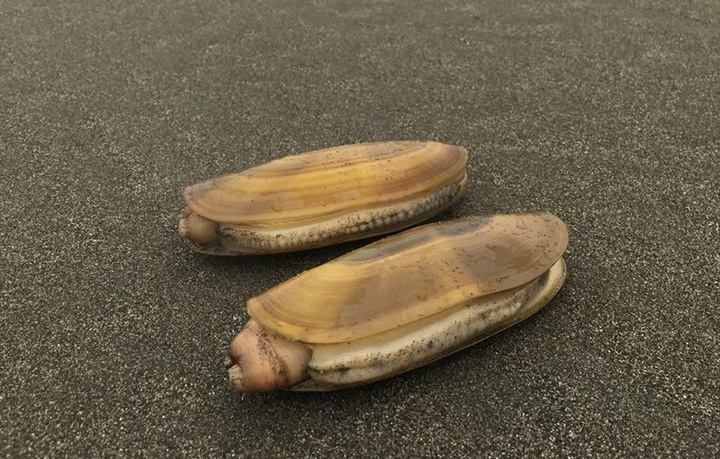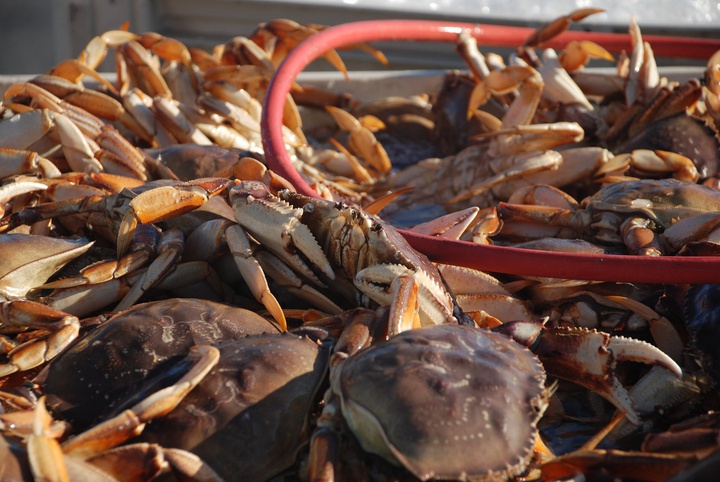Jessica Cejnar Andrews / Friday, Nov. 4, 2022 @ 11:34 a.m. / Environment, Ocean
Unsafe Domoic Acid Levels Prompt Razor Clam Fishery Closure; CDFW Gearing Up for Dungeness Crab Quality Testing as Recreation Season Opens Tomorrow

Unsafe levels of domoic acid prompted wildlife officials to close the razor clam fishery in Del Norte County on Thursday. | Photo courtesy of the California Department of Fish and Wildlife
(Updated at 7:04 p.m. to clarify that crab tested in October passed for domoic acid, the whale entanglement risk assessment during Thanksgiving is statewide and predetermined opening dates is related to that risk assessment.)
California wildlife officials have closed the Del Norte County recreational razor clam fishery due to the potential threat of domoic acid exposure.
The California Department of Public Health also updated an advisory for all bivalves in Humboldt County on Thursday after detecting elevated levels of domoic acid in mussels. This warning comes after CDPH warned consumers not to eat sport-harvested mussels, clams or scallops from Humboldt County due to paralytic shellfish poisoning.
This news also comes as the California Department of Fish and Wildlife scientists are gearing up to conduct quality testing for Dungeness crab ahead of the local recreation and commercial seasons.
While domoic acid is at unsafe levels in bivalves, crab tested in early October have passed, Juhasz said.
The federal action level for domoic acid in clams and mussels is 20 parts per million. For Dungeness crab, unsafe levels of the toxin are greater than or equal to 30 parts per million.
“We’ll also have to look at quality testing," Juhasz said. "We’re planning on doing that in the next week as well.”
CDPH tests mussels bi-monthly at locations up and down the California coast. Juhasz noted that paralytic shellfish poisoning wasn’t detected in Del Norte County mussels, and the quarantine for other parts of the state ended on Oct. 31.
According to a CDFW news release Thursday, a sampling of razor clams from Crescent Beach in late October found some exceeding 20 parts per million.
A naturally occuring single-celled marine alga, Pseudo-nitzschia produces domoic acid. Bivalves then accumulate the neurotoxin without being harmed. According to a CDFW news release, razor clams can still have unsafe levels of domoic acid in their system long after a bloom has abated.
Domoic acid poisoning can occur in humans within minutes to hours after consuming affected seafood. Symptoms range from vomiting and diarrhea to permanent loss of short-term memory, coma or death. There is no way to prepare clams for consumption that will remove the toxin.
Further south, it’s not domoic acid but the possibility for whale entanglement that’s delaying the commercial Dungeness crab season in the CDFW’s central management area up to the Sonoma-Mendocino County line. According to Juhasz, CDFW will conduct a risk assessment the week before Thanksgiving statewide.
Quality tests will also determine if the Dungeness crab fishery in the Northern area — Mendocino to Del Norte County — can open on Dec. 1, according to Juhasz.
CDFW is hoping to provide more predetermined season opener dates to the commercial fishing fleet, Juhasz said. This will better enable Dungeness fishermen statewide to prepare for a potential delay due to the potential risk of whale entanglement, she said.

The recreation Dungeness crab fishery starts on Saturday and CDFW scientists will begin quality testing for the upcoming commercial season next week. | File photo: Jessica C. Andrews
Last year, Del Norte County commercial crab fishermen were able to start the season on time — Dec. 1. It was the first time since 2014 that quality issues, domoic acid concerns or dispute with seafood processors over price hadn’t gotten in the way.
Juhasz also noted that the recreation Dungeness crab fishery opens on Saturday with some new regulations. There is a crab trap restriction statewide due to the entanglement risk to whales and turtles they pose, she said.
However, people can still use hoop nets, which is typically used on piers and jetties though some use them on boats, Juhasz said. Folks can also use another device called a crab snare or they can take them by hand if they go diving for them.
CDFW will continue to work with the California Department of Public Health to collect, monitor and test razor clams to determine when the recreational fishery in Del Norte County can safely resume.
For more information on closures or health advisories, click here. To get the latest on domoic acid-related fishing closures, call (831) 649-2883. For consumption warnings, call CDPH’s Biotoxin information line at (510) 412-4643 or (800) 553-4133.
CLICK TO MANAGE